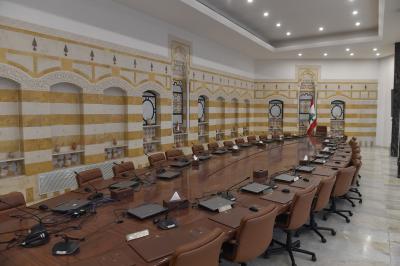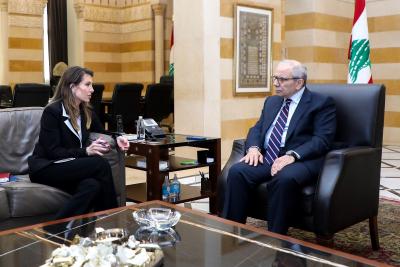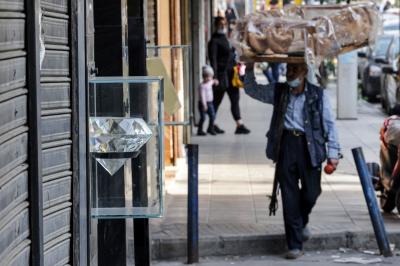In 2021, the International Monetary Fund (IMF) issued a statement declaring that Lebanon was facing unprecedented challenges requiring the implementation of a comprehensive reform plan. This plan included: directly addressing the core issue of weak governance, executing a fiscal strategy, carrying out a thorough restructuring of the financial sector, and establishing a credible monetary and exchange rate framework.
These four pillars are not the ultimate goal but rather a necessary gateway to entering into an IMF program. Importantly, the Fund's experts have not revised these core conditions, which remain prerequisites for any potential agreement. It’s worth noting that fulfilling these requirements would further oblige Lebanon to implement a set of broader measures outlined in the “Washington Consensus” — a list of ten economic policies that must be adopted for full access to IMF support.
Tackling the Core Issue of Weak Governance
The IMF insists that “transparency-enhancing reforms must center around strengthening the anti-corruption framework and improving the performance of state-owned enterprises, particularly in the energy sector. This must include audits of both the Central Bank of Lebanon and the national electricity company.”
Corruption in Lebanon is notoriously complex, having evolved into a widespread culture of “cleverness” deeply embedded in both public institutions and the private sector. This raises a crucial question: Who will be held accountable once audits of the Central Bank and Electricité du Liban are completed? The answer, theoretically, is the judiciary.
Implementing a Fiscal Strategy
The IMF calls for “a fiscal strategy that combines a deep debt restructuring with credibility-restoring reforms, enhanced transparency in public finance, and expansion of the social safety net to protect the most vulnerable.”
This request aligns with the first measure of the Washington Consensus: reducing the budget deficit to below 1–2% of GDP. Yet this poses a major problem. Lebanon’s deficits, both in the 2024 and 2025 budgets, exceed those figures, contrary to official statements. For instance, the 2024 budget omits $2 billion in Iraqi fuel-related dues owed by Lebanon and fails to account for war-related costs arising from Israeli attacks. Similarly, the 2025 budget disregards projected revenue declines and increased spending, as it was approved by Cabinet before the conflict began.
Oddly, the IMF’s March 2025 concluding statement following a technical visit to Beirut (March 10–13)** asserts that: “Recent policy measures have helped preserve a degree of economic stability. Inflation has eased, and the exchange rate has stabilized following the elimination of fiscal deficits since mid-2023…” This is surprising, considering the IMF is fully aware that Lebanon’s budget numbers do not reflect reality. Is this a subtle encouragement from the Fund?
As for debt restructuring, the IMF mentions the need for a “deep restructuring of debt.” Yet no serious negotiations have taken place with either domestic or international creditors. Regarding fiscal transparency, Lebanese citizens are still waiting for audited state accounts dating back to 2004 — the last approved account being from 2003, which is known to be unreliable. These audits are critical, especially given that the head of the Parliamentary Finance and Budget Committee spoke of $27 billion in unaccounted funds, alongside a lawsuit investigating $6 billion wasted in the telecom sector, and over $48 billion transferred to the national electricity company, as revealed by Alvarez & Marsal.
Is there any reasonable hope this will all be implemented promptly?
When the IMF refers to “expanding the social safety net to protect the most vulnerable,” it is implicitly suggesting a broader tax base and a potential World Bank loan to support low-income families.
Comprehensive Financial Sector Restructuring
The IMF also demands “a comprehensive restructuring of the financial sector, beginning with the upfront recognition of losses by private banks and the Central Bank, while protecting small depositors.”
This primarily concerns depositors' funds. The IMF wants the Central Bank and private banks to acknowledge their losses, without mentioning the Lebanese state. The rationale is clear: Lebanon’s public debt, now estimated at $110 billion — over 500% of GDP (well above the Maastricht Treaty’s 60% ceiling) — is unsustainable. The IMF is indirectly asking for the domestic debt to be written off. This becomes clearer in its call for a “deep restructuring of debt.”
Of Lebanon’s $110 billion public debt, Eurobonds account for $33 billion, $17 billion of which are held by international institutions. Any haircuts could lead to lawsuits and asset seizures abroad. As such, the path seems headed toward writing off the state's debt owed to the Central Bank and commercial banks — effectively a haircut on deposits, especially large ones. The IMF’s language — “while protecting small depositors” — reinforces this.
This presents a dilemma for Lebanon’s political class: approving debt write-offs could be politically costly in upcoming elections, while rejecting them could derail any IMF deal.
Establishing a Credible Monetary and Exchange Rate Framework
The IMF’s fourth requirement is the “establishment of a credible monetary and exchange rate system, centered on unifying multiple exchange rates and accompanied by temporary formal capital controls.”
In other words, Lebanon must pass a Capital Control law to curb the cash economy and prevent capital flight, while also unifying its exchange rates. One such rate — the bank withdrawal rate of 15,000 LBP to the dollar — still exists. Capital controls and rate unification, however, do not mean depositors will regain access to their funds in Lebanese pounds. The new Central Bank governor faces the challenge of deciding whether to maintain circulars that allow partial deposit withdrawals.
Conclusion
Given the above, the road to signing an agreement with the IMF remains highly obstructed. One final — yet crucial — unmentioned factor complicates matters further: the implementation and sustainability of a ceasefire with Israel. As of now, this remains far from guaranteed.
Please post your comments on:
[email protected]
 Politics
Politics












